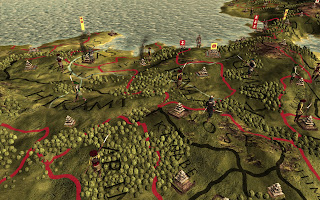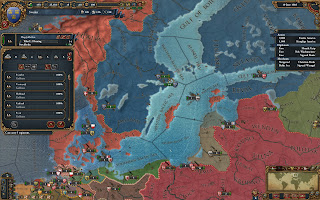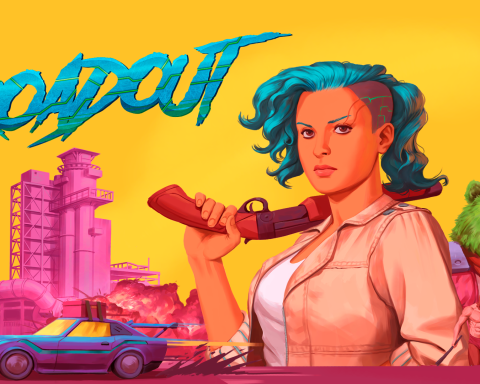 Before my laptop went belly-up, one of my favourite developers was Paradox Development Studio. Best known for producing the most hardcore of hardcore strategy games, Paradox games, like Europa Universalis, Hearts of Iron and my personal favourite, Sengoku, all share one thing in common – you can lose months of your life to each and everyone one of them.
Before my laptop went belly-up, one of my favourite developers was Paradox Development Studio. Best known for producing the most hardcore of hardcore strategy games, Paradox games, like Europa Universalis, Hearts of Iron and my personal favourite, Sengoku, all share one thing in common – you can lose months of your life to each and everyone one of them.
From intricate political systems to empire building that makes Civilization look like Angry Birds, this is a studio for genuine fans of strategy games.
The studio’s lead, Johan Andersson, sat down with us to have a chat about the team’s design philosophy, and where the studio is heading in the future. While it’s a little disappointing that there is no intention there to build games for the consoles (surely the PlayStation 4 would be able to handle a Hearts of Iron game!) it’s good to see that there are developers out there of a substantial size that are still committed to a purity of vision, rather than chasing after a mass-market that might not be there for their games.
Digitally Downloaded (DD): What are your priorities for the next year?
Johan Andersson (JA): Next year? Oh my, that is still secret. Sorry!
DD: Paradox Development Studio has grown rapidly over the past year and acquired a new legion of fans. And yet you produce games that are not generally considered to have a mainstream appeal. How do you balance that growth with the desire to produce complex strategy games?
JA: Well, I don’t agree with the position that a game is either mass market or complex! The biggest challenge a developer faces have is in interface design. Improvements to your interface allow you to keep the same level of complexity while at the same time broadening the appeal. With a new a game and the freedom it offers we can start from square one with the interface. So we are looking to streamline the interface to help new and old players alike. To give two examples of this in Paradox Development Studio games – you have the outliner and alerts. Looking back on it I wonder how I played without them because they make the games so much easier to play. One of our goals with Europa Universalis IV is to keep the complexity in the game, but at the same time make the game more intuitive and less complicated to get into for the player.
What I believe has really helped the game is that when you play our games, the game creates stories that you want to tell other people about. So the simple answer would be that it is a game that makes people talk about it, because they want to share their stories, the intrigue, the attacks, the backstabbing and alliances. Because we strive to create games that can surprise you and keep an ebb and flow in gameplay.
Let´s take our upcoming game Europa Universalis IV as an example, an empire building game where you take command of a country, playing more the guiding spirit than the ruler, and steer it over 400 years of history. When building your empire, you have different tools at your disposal to choose from – such as trade, exploration, diplomacy and warfare during the age of discovery. It is a sand box game, because you have no fixed victory conditions, instead you as a player set your own goals. We try to maximise the game choices available to each individual country to give you most strategic choices.
+copy.jpg) |
| Sengoku |
DD: What makes for a good strategy game?
JA: Fun, always fun. Our goal is not create an accurate recreation of history; instead we look at the historical choices that countries faced at the times. We look at the most interesting and important events and then we build the game logic to make these choices good in game terms. So as a player you face the same kinds of choices that countries. Because the thing with history is not only that it lets you recreate your favourite ‘what ifs’, it also allows for really varied gameplay. If every country is unique, every new gaming session will be unique.
I know plenty of reasons behind what makes a good strategy game and they all come down to what we ourselves love about games, which have become almost like a manifest for us:
1. We want gamers to have the freedom to take their own choices and decisions when playing.
2. We want gamers to be able to play the game again and again, where every game is a whole new experience.
3. We want games to have an ebb and flow in gameplay, so that the game never goes static.
4. We want gamers to be able to choose what tools they want to use and offer many ways to gain power.
5. We want all games to be able to play in multiplayer and be completely moddable.
6. We want our games to be sandbox on a grand scale so that the gamers can set their own goals.
7. We want gamers to be able to either relive history or recreate it.
We all at the team have a great passion for history that should be obvious for anyone who has played our games. But to be honest, the historical setting is also a practical one. There is a large advantage in creating games based on history has over fantasy or science fiction; accepting and knowing the world from the start. In fantasy or sci-fi, as a game developer you need to create a back story and a world, you need people to accept it and love it and want to spend time in it. But when you base a game on history, people are familiar with it and recognise it, they even have a relation to the events and the countries and either want to recreate it or change history. So it creates a superb narrative on which to build a game on.
We are not saying that Paradox Development Studio never will do a game in a fictional universe, but right now we focus on our strength in making history come alive. The setting is the inspiration, but what we create in each time era and setting is that all our games do feel different to play, take on different aspects of the period, or interprets things in different ways. The setting, that it takes place in our world, is really the only thing that is consistent because the feeling and the focus of the games vary for each game series.
 |
| Crusader Kings 2: Sword of Islam |
DD: What opportunities do you see to expand your current range of game projects? Do you see an opportunity to bring serious strategy games to the console audience, and why do you think the genre has not traditionally done well away from PCs?
JA: A large part of the development team have worked on consoles before and we all definitely prefer PC. PC gives us the freedom to create the games we want to create and make them just as we want them to be. We hope they come across as grand, fun and challenging and we´re not sure we could make that on console. I’ve worked for over 18 years in the gaming industry, and I’ve seen so many things come and go, that I just believe in one thing; “good games sell”. If people like the game and enjoy the gameplay, the game will sell. Maybe some games sell slowly over time but I honestly believe that if the game is good, it will reach it audience sooner or later. There are no current plans at the moment to branch out to more platforms, our main focus right now is to make Europa Universalis IV into an empire building game like no other.
DD: The iPad and other tablets have started to see serious wargames become available to download. What has held Paradox back from either porting some of its games or developing new iOS titles?
JA: We are definitely interested in bringing our games to tablets. However, with current machines, our games would not work that easily, as they require a fair bit of memory. So I’d expect us to have to do pretty creative engineering to handle it. Because we can’t do stuff like removing features or making fewer countries playable, as that would not be a Paradox Development Studio game. Our games are supposed to be complex and fun. I’d expect a game like our political simulator Victoria II would actually be the easiest to port, especially when it comes to interface. Since the gameplay there when you try and steer your country through the industrialization and the political reforms is a lot about “nudge these values, let time fly to see effects and watch your people revolt against your government”. So we´ll see what the future holds when it comes to iPad games.
DD: Increasingly the games industry is moving to freemium and DLC-supported monetisation models. Do you think there is a role for those models in strategy gaming?
JA: No, but I absolutely believe in DLC systems that allow developers to create more content and for gamers to pick and choose what interests them and keep supporting a game they love so that the development can progress for the game.
For Crusader Kings II, we developed a new system to handle modular expansions, so that gamers can get the small packages that they want when they’re released, and it will all be using the same executable, so whichever expansions they own your game will see continued support. There will be no problems with this in multiplayer, and if they have bought one expansion and their friends have bought another, they can still play together. Since we introduced it, we are releasing smaller expansions and expansions more regularly, containing more focused features so that our gamers can buy the ones they want, skip whatever they like and get the most for their money.
Earlier, we needed to make sure the expansions we build were what most gamers wanted. Like Europa Universalis III, where each expansion builds on the previous ones. Now we can try out both larger and smaller ideas, create DLCs that a smaller part of our community requests, create something completely different, provide enhanced graphics and sprite packs for those who want without forcing all gamers to get them etc. Our modular DLC system allows us to continue developing the game long past the original release date. The continued stream of revenue means we can revise and improve on features for free in major content patches, which in turn helps to keep the game alive and evolving. Players keep coming back to the game to see what we’ve improved since last time they played. In many ways, it’s almost like a little MMO.
 |
| Europa Universalis IV |
DD: How do you see the strategy genre evolving in the future?
JA: Well, I am not crazy about answering questions about the future, so I´ll keep it brief. Better interfaces, better AI and better graphics.
DD: How do you encourage your team to be innovative?
JA: Oh dear, lots of stuff I hope. We have Creative Fridays once a month where people can choose more freely what they want to work with, we have Friday beer every week, try to do team building, make sure people get variation in projects, possibilities to pitch their own ideas for updates, expansions, DLCs and basically get a chance of creating the games they love themselves. We constantly play our games in the office, we have a multiplayer session once a week and we have discussion about the games and everyone can give feedback that I certainly hope all on the team knows is listened to.
DD: Finally, what games are you playing at the moment?
It is like asking a parent to choose their favourite child. Don’t force me to do that please! I love all our games and I play them in my spare time. Our game series are all different and I appreciate their own strengths. Europa Universalis for the empire building, Crusader Kings for the strong characters, Hearts of Iron for the warfare and Victoria for the political approach. Of course I play other games as well, but since I have became a father a year ago, it is harder to find the time to play as much as I used to. But I have definitely used time for games such as Civilization, World of Warcraft and Football Manager as well as plenty of board games.
But right now I am absolutely playing the Europa Universalis IV beta most of all, but I should probably not say my own game right? But I do love that the minute I start up a game I am thrown right into the dynamics of historical possibilities and choices.






